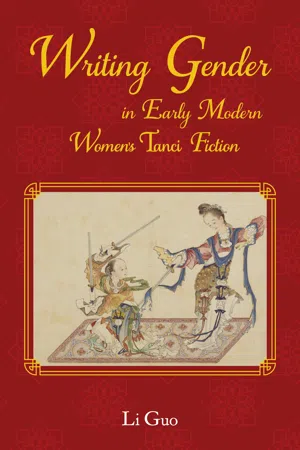
- 362 pages
- English
- PDF
- Available on iOS & Android
Writing Gender in Early Modern Chinese Women's Tanci Fiction
About This Book
Women's tanci, or "plucking rhymes, " are chantefable narratives written by upper-class educated women from seventeenth-century to early twentieth-century China. Writing Gender in Early Modern Chinese Women's Tanci Fiction offers a timely study on early modern Chinese women's representations of gender, nation, and political activism in their tanci works before and after the Taiping Rebellion (1850 to 1864), as well as their depictions of warfare and social unrest.
Women tanci authors' redefinition of female exemplarity within the Confucian orthodox discourses of virtue, talent, chastity, and political integrity could be bourgeoning expressions of female exceptionalism and could have foreshadowed protofeminist ideals of heroism. They establish a realistic tenor in affirming feminine domestic authority, and open up spaces for discussions of "womanly becoming, " female exceptionalism, and shifting family power structures. The vernacular mode underlying these texts yields productive possibilities of gendered self-representations, bodily valences, and dynamic performances of sexual roles. The result is a vernacular discursive frame that enables women's appropriation and refashioning of orthodox moral values as means of self-affirmation and self-realization.
Validations of women's political activism and loyalism to the nation attest to tanci as a premium vehicle for disseminating progressive social incentives to popular audiences. Women's tanci marks early modern writers' endeavors to carve out a space of feminine becoming, a discursive arena of feminine appropriation, reinvention, and boundary-crossings. In this light, women's tanci portrays gendered mobility through depictions of a heroine's voyages or social ascent, and entails a forward-moving historical progression toward a more autonomous and vested model of feminine subjectivity.
Frequently asked questions
Information
Table of contents
- Cover
- Writing Gender
- Title
- Copyright
- Dedication
- CONTENTS
- Acknowledgments
- Note on Style and Excerpts
- Introduction Toward a Spatialized Understanding of Women’s Literary Tanci
- Chapter One Vernacular Literacy, Cross-Dressing, and Feminine Authority in Zhu Suxian’s Yulianhuan (Linked Rings of Jade)
- Chapter Two Among Women: Feminine Homoeroticism in Li Guiyu’s Liuhuameng (Dream of the Pomegranate Flowers)
- Chapter Three Gender, Syncretism, and Female Exemplarity: Jin Fangquan’s Qizhenzhuan (A Tale of Exceptional Chastity)
- Chapter Four “Beyond Rouge and Powder”: Rewriting Female Talent in Sun Deying’s Jinyuyuan (Affinity of the Golden Fish)
- Chapter Five A New Romance of the Nation-State: On Wang Oushang’s Zixuji (A Tale of Vacuity)
- Conclusion
- Glossary
- Works Cited
- Index
- About the Author